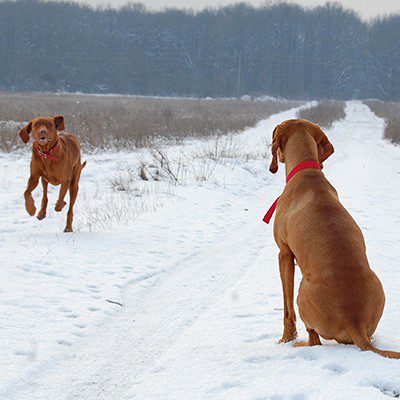When winter weather hits, it’s important to keep your pet’s safety in mind. There are several toxins that present a real hazard this time of year! Here, your Roanoke, VA veterinarian tells you about the most common winter pet poisons and how to have your pet avoid them.
Ice Melt
Most ice melt products are made with sodium chloride, otherwise known as salt. You don’t want your pet ingesting it! Small amounts of salt can lead to an upset stomach and skin irritation, while large amounts can result in a serious case of poisoning. Don’t allow pets to track ice melt indoors on the paws; avoid ice patches when outdoors, and store ice melt carefully where pets can’t reach.
Antifreeze
Episodes of antifreeze poisoning rise in the wintertime, as car owners use the substance to keep their engines running smoothly. Antifreeze is often made with ethylene glycol, an alcoholic substance that can poison pets in very small amounts. It even smells and tastes sweet, which could attract pets! Don’t use antifreeze with your pet nearby, and clean up any spills right away.
Holiday Plants
Holly and mistletoe, common around the holidays, can poison a pet who ingests too much. Poinsettia plants aren’t likely to cause serious poisoning, but they can upset your pet’s stomach and cause mouth and throat irritation. Other common wintertime plants like lilies, Autumn crocus, and Amaryllis also present a hazard. Make sure your pet stays far away from harmful plant life!
Pesticides
Small rodents and insects like to invade our homes in the winter in an effort to seek shelter from the cold weather outside. You might use pesticide or rodenticide products to ward them off. Remember that these products are poisons, designed to kill! Place pesticides very carefully, or choose non-toxic alternatives like traps, so that your pet stays safe.
Medicine
Cold and flu season will be upon us before you know it. Remember that a variety of human medications—cough syrup, aspirin, prescription drugs, and much more—can poison your pet! NSAIDs like ibuprofen are an especially common pet poison, and can cause reduced blood flow to your pet’s kidneys and damage to the intestinal lining. Keep the medicine cabinet shut tightly so that your pet can’t reach any harmful pills!
Want more tips for keeping your pet safe as the winter weather rolls on? We’re here for you. Call your Roanoke, VA vet.



